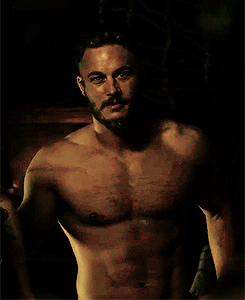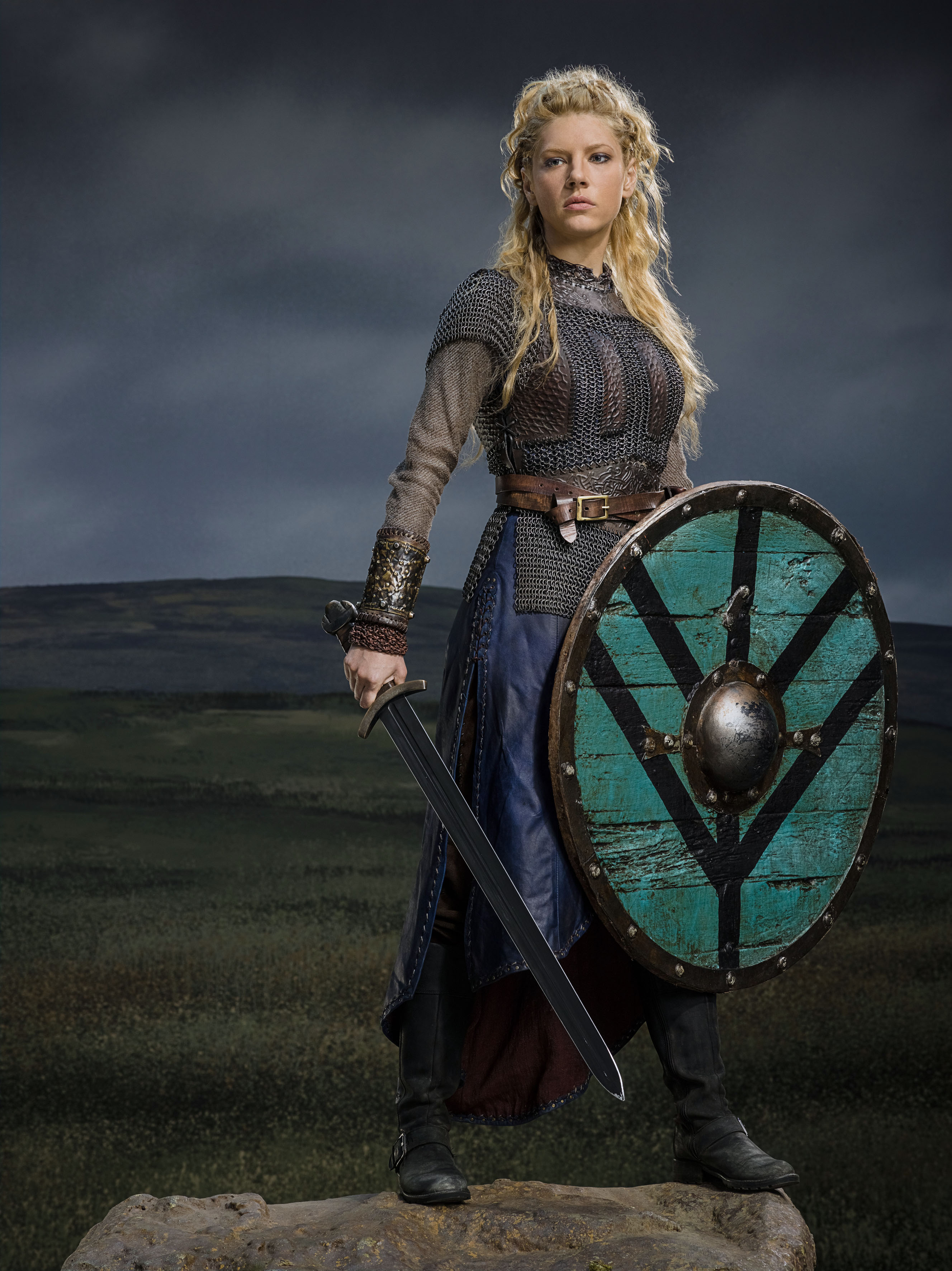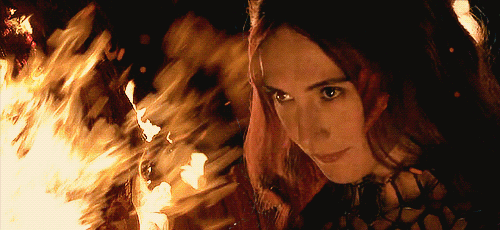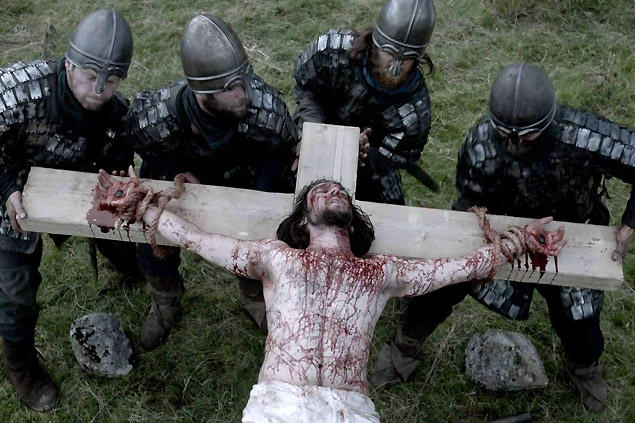A while back someone asked Kylie how she would compare Game of Thrones to other popular TV shows, like History Channel’s Vikings. The coincidence is that I had just watched three seasons of Vikings when her article about Black Sails was published. I had been planning on writing something about it anyway, but now that I think about it a lot of things can be said about Vikings, especially when compared to Game of Thrones. Specifically, in every way that Game of Thrones fails, Vikings succeeds. Be warned, spoilers lie ahead.
On a surface level, the two shows seem very much alike. They are both period dramas, one taking place in the Middle Ages and the other in a Pseudo-Middle Age. Both are beautifully costumed and propped, and both have some truly stunning cinematography. They even have comparable battle scenes as the budgets for both shows increase, but Vikings truly distinguishes itself in the writing. Whereas Game of Thrones waffles it at almost every chance they get, Vikings continues to please and becomes better with time.
As with most media, the strength of the narrative overall comes from its characters. All the characters are nuanced and developed, but the best written character overall is the lead, one Ragnar Loðbrok, played by Travis Fimmel. His character is the textbook example of a morally ambiguous protagonist, both likeable and despicable while always being compelling.

Game of Thrones likes to talk about moral ambiguity, but as the show has progressed the factions have become ever more black and white. Tyrion Lannister in particular has become what we here and Fandom Following like to call “Saint Tyrion.” Everything he does is rewarded by the narrative and he is always on the moral high ground. Heck, even sex slaves who are raped on a daily basis will offer to have sex with Tyrion. He already has the curly hair, all he needs now is a halo and he would not be out of place in a Byzantine mosaic. Peter Dinklage gives his prodigious skill to the role, but his acting cannot save the character from horrific scripting.
Ragnar is a viking; raiding is his way of life and the only way he can gain distinction in his culture. Every time he leaves home he is doing so with the intention of killing lots of people and stealing all of their stuff. Vikings never shies away from that. Season 1 includes the raid on Lindisfarne, a monastery in Northumbria, wherein Ragnar and his fellows kill every single monk they can get their hands on, all of whom have no training in weapons and attempt to flee. He spares one because the monk can speak both Old English and Norse, but the other survivors are sold as slaves. This was just Season 1
Seasons 2 and 3 include things like chaining a bishop to a wall and turning him into an arrow pin-cushion. Ragnar executes a treacherous earl by way of the “Blood Eagle,” which is a very unpleasant way to go. Ragnar even evokes the Red Wedding when he slaughters the entire family of a King. True enough, the king was trying to kill all of Ragnar’s family, but Ragnar is similarly brutal; not even the king’s daughters escape the axe.

Yet, through it all, Ragnar himself is a good man. Ambitious, yes, but thoroughly good. He is devoted to his family, and he always puts the needs of his sons and wives first. I say wives because he is twice married; when his first wife divorces him, he is shown to be in anguish and even cries as she leaves him. He knows that he has made a mistake, and apologizes fervently for it, and the narrative itself does not frame his wife as unreasonable. For all his murderous tendencies, Ragnar is only ever good to his family and those who he is closest to. He even forgives his brother, Rollo, who betrayed Ragnar and lead an army against him. His best friend, the former monk Athelstan, is constantly under threat from the mistrustful pagans, and Ragnar always protects him. When Athelstan dies, Ragnar is in such anguish that the show spends several episodes covering how deeply the loss affects him. Through and through, Ragnar shows himself to be both a good man and a violent ruler, but he is always compelling.
Season 6 of Game of Thrones was touted as “Women on Top,” but all it ever showed was women as either voluptuous vixen who use their sexual prowess to manipulate men or adhering to a toxically masculine conception of strength, killing without a thought. Two examples of this: Margaery Tyrell and Brienne of Tarth.
Margaery is THE sexual manipulator, and the only way she is shown to have power is through having sex. She might be said to be clever, but it is never shown by the show, and most of the time it is ignored that she comes from one of the most powerful families in Westeros. She only ever plays “the great game” in the bedroom. Brienne is supposed to be the moral center of Jaime’s arc and Westeros in general, upholding the ideals of chivalry and knighthood in an ever corrupt world. Game of Thrones delivered us a Terminator who effortlessly mows through troops and kills without a second thought.
Vikings delivered us the wonder that is Lagertha, played by Kathryn Winnick. Lagertha is the best of all things rolled into one character. She is a Shieldmaiden, a woman trained in the arts of war, and she is shown to be one of the greatest warriors on the show, capable of taking down her husband, who is himself extremely skilled with an axe. When she rides into battle it is best to get out of her way. More than that, though, she is an earl who commands a sizeable army and navy. It is her arrival and aid that makes all of Ragnar’s achievements in Season 2 possible. She suffers domestic abuse; no one calls her weak for it, as her horrific marriage was the only foreseeable way to ensure security for her children, but she escapes from that place and it is never said that she needed to suffer to be stronger, or that this abuse made her a “hardened woman.” With just a few episodes this show destroyed so many stereotypes about abuse victims I could go on forever just about that one aspect.


Best of all, Lagertha is completely in control of her sexual agency. Even after she divorces her husband, she maintains an active romantic life and she never falls into the narrative conventions of such a liberated woman. She does not gain her power through sex, manipulating powerful men with her womanly wiles. She wins the support of her people and usurps the old earl. When she does have sex it is always on her terms and it never clouds her judgement.
For example, after she nails the King of Wessex, she decides to return home to her earldom. She thanks him for sharing the bed with her, and even compliments his performance, but asserts that she has responsibilities at home and that their relationship was only ever for the sex. It was beautiful.
Another hallmark of Game of Thrones’ “Women on Top” is the “I’m not like other girls” trope — the idea that women who are traditionally feminine are inherently weak or wrong in some way, that the only way to be worthy of praise is to be traditionally masculine. Sansa Stark is a perfect example of this. When the show starts she is punished at every turn for being a traditional woman. She is shown as shallow and frivolous, and everything that follows is a result and punishment for her femininity. Her abuse by the Lannisters, Petyr Baelish’s predatory advances, her rape by Ramsay Snow/Bolton, it was all to break her away from those nasty girly things and make her into a hardened woman.
To answer that, Vikings delivers us Aslaug, played by Alyssa Sutherland. Aslaug serves in many ways as a foil of Lagertha. Aslaug has no knowledge of warcraft or weapons, whereas Lagertha is a warrior. Aslaug comes from wealth and privilege, born as a princess. Lagertha was born a poor farmer, and while land ownership made her wealthy in a way, Lagertha never enjoyed the finer things. Aslaug even destroys Ragnar and Lagertha’s marriage. True, it was Ragnar’s decision to cheat on his wife, but Aslaug makes darn sure the marriage ends by showing up in Ragnar’s home, heavily pregnant, and making sure everyone knows that the child is Ragnar’s. In any other movie, she might be the villain.
Instead, Aslaug is shown to be a capable ruler. While her husband and the men (and Lagertha) are all away raiding, Aslaug and her friends Siggy (the wife of a dead earl) and Helga (a semi-priestess and wife of a boat-builder, which is a semi-spiritual occupation) rule Ragnar’s holdings. She does it very well too, all the while looking stunning in fine silks and furs. She is also a voice of nurturing kindness in a harsh world. When one of her sons is born deformed, Ragnar wants to leave the child for the gods (that is to say leave the baby alone in the woods at night), but Aslaug fights him and raises the child anyway. Even when she must go into hiding and leave all her wealth and luxury behind, her complaints are never for her own comfort but worry for her children. She fosters love wherever she can and brings peace to a world beset with violence. She never looks down her nose at the shieldmaidens and they never pass judgement on her or women like her. It is always fun to watch her rule so effortlessly, especially when the narrative never punishes her for it.

As a side note, no woman ever suffers from “Womb Syndrome” either. Not because they never show concern for their children, but because the men show equal concern for their children. Motherhood is never made to be a weakness more than fatherhood or parenthood in general.

In “Weisseroff” there are only two flavors of religious folk:
- The religious zealot who burns non-believers
- The religious zealot who persecutes gay people
No one of a sympathetic persuasion is shown to be religious, and all people who are religious are framed as crazed fundamentalists, devoid of reason and blindly following the religious figurehead. All the reasonable people are either super-agnostic or straight-up atheist, and they are unfailingly portrayed as reasonable, guiding lights for people to aspire to. For D&D, religion is a source of evil only.
Compare that to Vikings. The writers chose an interesting time to set a Medieval Drama, for while the Catholic Christians are everywhere in Western Europe, go too far away from the Rhine and you find yourself firmly in pagan territory, either the Slavic gods to the West or the Norse gods to the North. The coming of the Northmen is not just two opposing armies, it is two opposing cultures and religions, and both are shown in all their splendor and horror.

Since we are coming into this narrative from a pagan perspective, it would be easy to show this religion as the “right” one. The norse gods allow women rights to own property, the right to divorce, the right to be priestesses, the right to be warriors, and the right to enter Valhalla, the norse paradise, when they die. The priests do not advocate raids to stomp out the Christians just because they are Christians. The priests are indifferent to Christianity, so long as it does not interfere with their rites and practices. These gods show sex as an act of fertility, not something that is dirty and must be hidden away. Compare this to the Christians, who think it is dirty to even speak with the pagans, much less makes terms with them. Women are property, fit only for marriage and bearing children, nothing else. Worse still, the Christians love to stomp out pagans wherever they can, and questioning doctrine is a crime punishable by death. It would be so easy to malign the Christians.

But then the narrative also displays the positive side of Christianity. Family, forgiveness, the preservation of knowledge that might otherwise have been lost. War happens, but God calls for peace with all his children. The society created by Christian kings is safe and secure, and has allowed these men to build great castles and monuments that will stand for centuries to come. To enter Heaven, good works, kindness, and faith are all that is needed. Sacrifice comes in the form of consecrated bread and wine in place of flesh and blood.
Compare that to the pagans, who practice both animal sacrifice and, on special occasions, human sacrifice. Entry into Valhalla only comes to those who die in battle, and the gods encourage bloodshed. Afterall, the only way to die in battle is if a battle is happening in the first place. In the north, usurpations and civil wars are common, and only the foundations of the wooden temples will survive to modern times, especially since precious little of norse history was actually written down.
The best thing about this show is that it actually can say “that’s how it was back then.” While Game of Thrones has to contrive the necessity of its violence, Vikings draws on a recorded history. True, the history is not 100% reliable, and true the History Channel has ironically fallen on hard times in the pursuit of historical accuracy, Vikings succeeds where documentaries fail. The costumes, the weapons, even the bits of spoken Norse and Old English, it is all historically based and sound. The only thing historically Inaccurate is the lack of diversity, as the vikings sailed as far south as the Congo and as far east as the Caspian, but perhaps this will be corrected in later seasons.
Even when showing such a brutal and violent time in western history, Vikings does not feel the need to imply rape or have gratuitous slaughter at every turn. It does not need it. The characters and the story is enough to keep the viewer invested. And for those of a more literary persuasion, themes of cultural loss, the meaning of family, and the meaning of life abound. It is all there for the taking, but for some reason Game of Thrones has a stranglehold on pop-culture. I wonder why.

